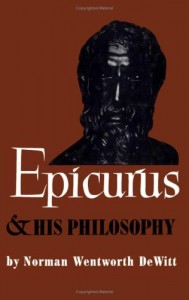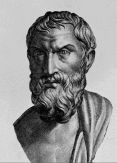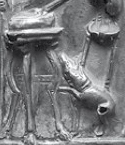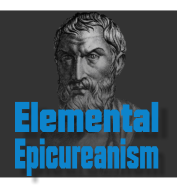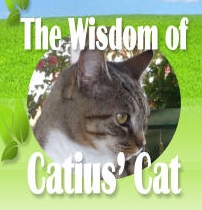Readers of this blog will find it no surprise that De Rerum Natura is our favorite Epicurean treatise. As this week’s addition to the blog, what follows is an exercise in summarizing the essential points of Book I of Lucretius’ poem in a manner that makes it more accessible to the modern reader. It goes without saying that this summary is a dim reflection of the original, but the work of creating it was enjoyable, and perhaps this digest version will be of assistance to someone who is not yet familiar with the text. The full text of the original as translated in 1908 by H.A.J. Munro is available here.
It seems a shame to stop before reaching the sections on free will, on understanding death, on defeating fortune through reason, and on the genius of Epicurus, but I am simply out of time. So here is Book I, and perhaps other books will follow in future weeks.
A Summary of De Rerum Natura, Book I.
In gratitude to Nature
for the joys of life,
I write these words
about the way things are.
There once was a time
when all humankind
lay oppressed under
the weight of superstition.
Men saw no answers
to the mysteries of life
and no way to live
but to obey the whims of gods
or the unyielding hand of Fate.
Then came a man who first
found the truth, that Nature
has no masters over her,
that the gods of the priests are false,
and there is no Fate but what we make.
This one man, by strength of mind,
explored the reaches of infinity
and came back to us
with news of what can be
and what cannot –
the standards set by Nature alone
which rule the universe forever.
Do not fear that by these words
you will be lead down the path of godlessness.
In fact the opposite is true,
for it is religion that so often
spurs men to commit evil deeds.
But fear of the unknown plagues all men,
and its flames are fanned by the words of the priests
who invent fantasies and threats
to undermine your logic
and destroy your confidence in reason.
For the priests know that if you come to understand
the limits of their power and the limits of your troubles
your mind will grow in strength
and you will resist them
and dismiss their superstitions.
But as things are, you are nearly helpless
For who can resist the fear of eternity in hell?
Surely not those who do not study the nature of the soul,
And whether it lives on after death
As the priests are quick to argue.
Yet there are true answers to such questions
and those answers dispel our fears and our darkness.
But the truth must be pursued with vigor,
and it can only be found through insight into Nature,
and in a sound understanding of the Nature of things.
There is a starting point, and a method,
from which all else follows,
a point to which our eyes bear witness,
and our reason provides assurance,
against the errors of religion and Fate.
And it is this: As we see for ourselves today,
and as all evidence cries out
was true in the past and will be true through eternity,
nothing is ever created from nothing,
not by the will of the gods, and not by Fate.
Once we see and understand
that nothing comes from nothing,
no matter how hard the priests or the slaves of fate may argue,
we shall see with great clarity from where all things do come,
and how all things are caused neither by the gods nor by Fate, but by Nature.
But we must first apply our reason to the evidence:
Do we see men burst forth newborn from the waters of the sea?
Do we see fish or birds born from the dirt of the earth?
Of course not – All things come from and are caused by
The seeds that existed before them.
Instead of randomness we see the opposite:
All things are born, grow, and dissolve again in accord with the rules set by Nature.
The rose blossoms in spring; the wheat ripens in summer;
The grapes burst forth in Autumn.
All things follow the rules of their seeds as given them by Nature.
And the seeds to which we refer, the elemental particles,
set the qualities and rules that Nature requires all to follow.
Including this: that at the end of their days those particles are never themselves
Destroyed absolutely. So our second rule of Nature
is that No thing is ever destroyed to nothing.
For if things could dissolve absolutely,
and totally cease to exist,
Then we would see things disappear before us in a moment,
And there would be no need of force to smash them.
But Nature sets a limit to destruction, and we see for ourselves
that no thing ever goes totally to nothing.
So now we see that if nothing comes from nothing,
and nothing goes to nothing, we are left with this conclusion:
The elemental particles of the universe are eternal,
and have never been created by gods or Fate,
Nor will they ever be totally destroyed, but last for all eternity.
Do you not see for yourself what this means?
If the basic substance of the universe is indestructible,
and has never been created from nothing,
then it is the arguments of the priests that are destroyed,
because we now see that the universe
was never created by their gods, but has existed eternally.
This is not to say that the universe has always
Existed in the form we see it today.
Quite to the contrary, we see for ourselves that
matter is always in motion, always changing
According to Nature’s laws.
Do not doubt my words about the substance of the universe
simply because these first particles are too small to see.
Many are the things we know to exist, but are invisible.
The winds send the clouds flying. Odors surely exist,
and yet we never see them, just as heat, cold, and sounds
surely exist, but are never seen.
Nature’s work is surely done by particles unseen,
but it is also important for you to realize that,
in addition to those particles, there is empty space – void –
in the things we see around us. Just as water seeps
through the rocks of caves, void exists through which the particles move.
Thus the nature of all that we see is dual – there is matter,
and void, within which the matter moves.
And why should you care about these observations?
Because our senses tell us that matter exists, and our reason tells us that the void exists,
and there is nothing else that exists other than matter and void.
Nothing else exists to which our senses and our reasoning minds may refer –
there is no third alternative, no mystical other dimension.
And this you must understand, because any thing that exists
is something in itself, with a character set by Nature.
Likewise, the void has no power to act, no Nature of its own,
other than the capacity to offer empty space.
Nothing but matter and void exist in the universe,
Either perceptible to the senses or apprehended by reason –
No supernatural gods, no Fate, no mystic dimensions.
Oh yes, there is much that is transitory,
Here today, gone tomorrow, but these are by-products
of matter and void. All that is transitory
is governed by the Nature of the things
From which they are composed.
These first-beginnings, these basic materials,
cannot change their properties at the whim of gods or men.
If they could, there would be no assurance of what can be,
and what can not be, no assurance of the determined
and immutable systems of Nature that we see does exist around us.
Many are the errors about the Nature of things that creep into our minds
from all directions – too many to mention here.
Fools always love and admire the things
their blindness sees as hidden meanings,
and they base their truths on what tickles their ears,
or seems to them the sweetest.
But nothing is more certain than that the
basic elements of Nature preserve their essences
in the same way forever. It is the goings and
comings of these basic elements, not the whim of gods or Fate,
that lead to whatever changes we do see around us.
I cannot list here each error, but this is the key to them all:
Those who argue that the senses are unreliable,
and cannot be trusted to assist us in determining the Nature of things,
Are resting their very arguments on the senses they attack.
This is absolute madness, for where can we turn for the truth
But to the senses that Nature has given us to separate the true from the false?
Think on these things, but come now,
Listen to what is left, and hear ever more clearly.
I know that these things are difficult to understand,
But I teach them to you to loosen your spirit
From the ties in which they are tightly bound
by religion and by error about the Nature of Things.
Perhaps you wonder why I write this as a poem,
why I seek to write clear verse rather than long discussions.
I do this for a reason: observe that when doctors
give bitter medicine to children, they rim the spoon
with the sweetness of honey. Such children are fooled,
but not swindled; they are led to health under cover
of sweetness.
In the same way, I know that my words may well be
unfamiliar, and many who have lived their lives
under false beliefs will find the truth distressing.
But fear not, only walk further with me through these
pathless groves, and we will drink from fountains
completely undefiled. With every drop, you will come to
better understand the true form and pattern of the Nature of Things.
Next we must turn our thoughts to the skies above,
For there appears to be no limit to the number of stars,
and the brilliant night sky is a source of great fear for some.
Understand this now: the universe is indeed limitless;
it has no boundaries, in any direction, in size it is infinite.
But in this infinity there is no need for fear.
No matter where you stand, if you run toward where
you may think a limit exists, and throw a javelin
in that direction, do you think that your limit will stop it?
The universe must be infinite, because either the javelin will
keep on traveling through the void, with nothing to stop it, or it will meet with matter
which therefore exists beyond what you thought was the limit.
And thus we see that there is no reason to fear
that the universe has no limits. Our senses
and our reason show us that all of the universe is composed of
matter and void; all the universe is composed of
eternal unchanging primal elements,
elements by which Nature alone determines the way things are.
There is much more to learn, but before we return
from the limitless universe, it is here we will stop for a moment.
Think on these things I have shown you, and on the method
by which we have reached our conclusions. From here, it will take you
but little trouble to learn the rest. Each lesson learned raises a light
which shows the way to understanding the next. Once you understand
these things, no darkness can stop you from obtaining
all the knowledge you will ever need of the way things are.
End of Book I














